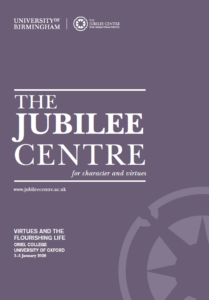Virtues and the Flourishing Life
3rd – 5th January 2020, Oriel College, Oxford
The eighth annual conference of the Jubilee Centre for Character and Virtues, University of Birmingham
Most of the recent burgeoning interest in the virtues, within philosophy and the social sciences, has been on the role of the virtues in good character and how to cultivate it. However, what is sometimes overlooked is that, historically (for example within Aristotelian approaches), the virtues are seen to be part and parcel of the flourishing life. Flourishing is a wider concept that simply that of good character, and in many ways more complex, politically charged and multi-layered. Terminological disputes abound, for instance, about the relationship between the concepts of ‘well-being’, ‘happiness’ and ‘flourishing’. Even for those who adopt the Aristotelian position of understanding flourishing (eudaimonia) as objective well-being, various theoretical and practical quandaries remain.
The main aim of this conference was to explore some of those quandaries and ask what it really means to live a flourishing life as a professional, student or just as an ordinary human being. What role (instrumental or non-instrumental) do the virtues play in such a life? Is it perhaps possible to lead a decent flourishing life without actualising the virtues, for example by just remaining well self-controlled or ‘continent’ in the Aristotelian sense? What would a flourishing school look like, above and beyond a school that cultivates good character in students? Does the concept of a ‘flourishing professional’ mean anything other than just being a ‘virtuous professional’? What are the socio-political conditions that need to be satisfied for someone to flourish? Finally, there is the question of whether flourishing is too bland or bloated a term to serve any useful purpose in academic or practical discourse. Cannot anyone just populate the term with any variables they happen to like? The aim of the 2020 Jubilee Centre annual conference was to bring together experts from a range of disciplines to explore those questions and many more. Can theorists from philosophy, education, sociology, theology, history and psychology learn from each other’s work? How can insights from theory and practice be integrated?
This conference featured parallel sessions devoted to general topics in the area of character, virtue and character education.
The Conference Programme is accessible by clicking the image below:
Abstracts and papers presented at the conference can be found here.

